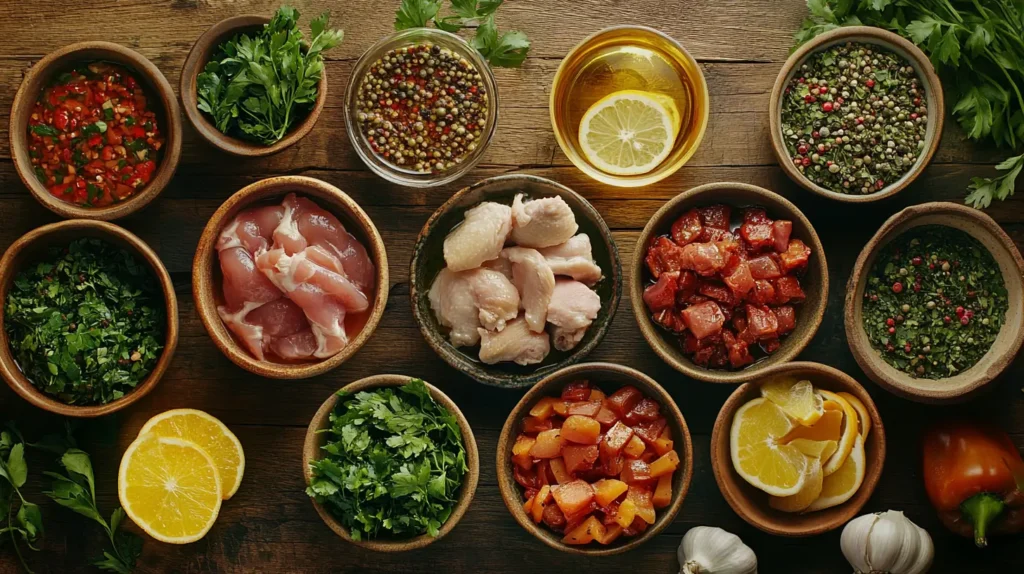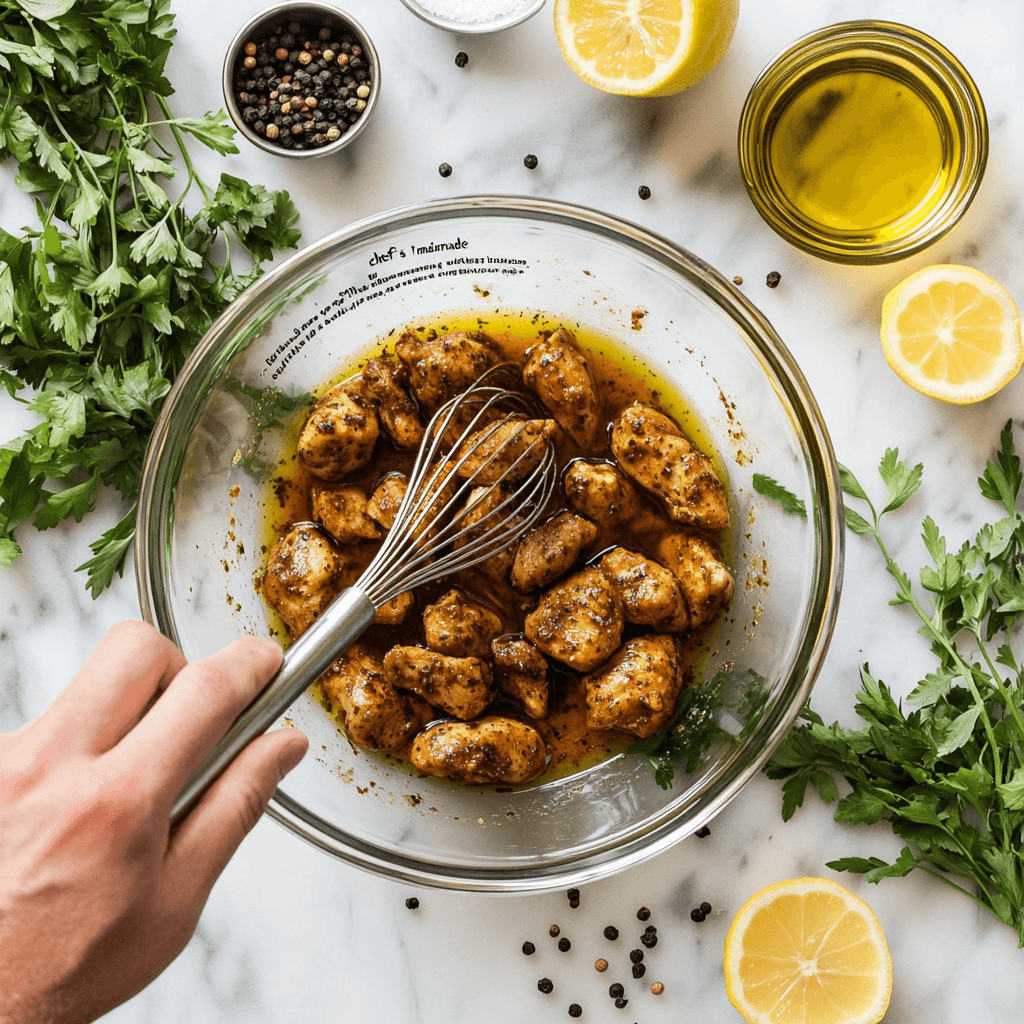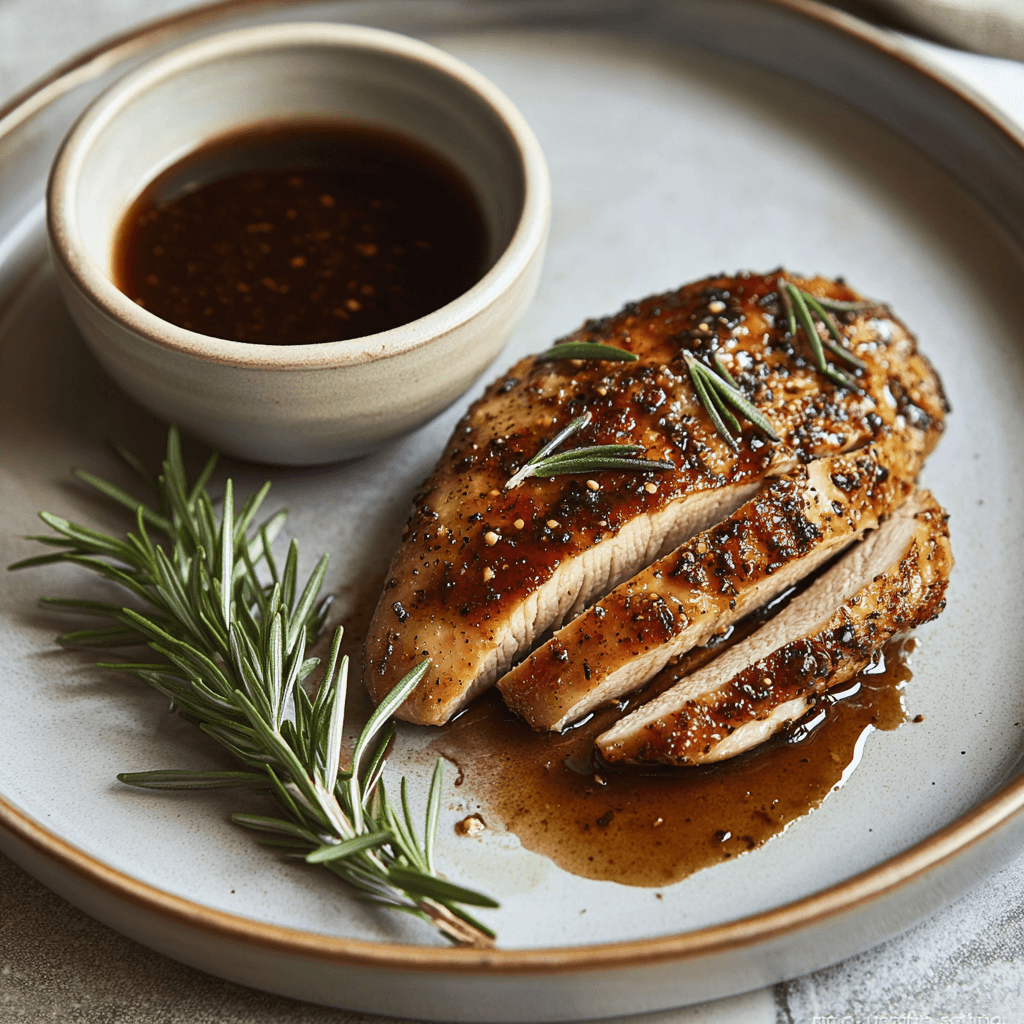Can you marinate chicken too long? Marinating chicken is one of the simplest and most effective ways to enhance its flavor and tenderness. By combining ingredients like oil, vinegar, citrus, or spices, a good marinade can transform plain chicken into a culinary delight. However, while marination is beneficial, leaving chicken in the marinade for too long can lead to unwanted results. From mushy textures to overpowering flavors, over-marinating can ruin your dish if you’re not careful

In this article, we’ll explore the art and science of marinating chicken. You’ll learn how long is too long, what happens when you overdo it, and how to avoid common mistakes. We’ll also cover tips for safe and effective marination and answer frequently asked questions to ensure your next chicken dish turns out perfect.
Table of Contents
What Is Marinating & Can You Marinate Chicken Too Long?
Definition
Marinating is a culinary technique that involves soaking food, typically meat, seafood, or vegetables, in a flavorful liquid mixture called a marinade before cooking. The marinade is usually composed of three main components: an acid (like vinegar, lemon juice, or yogurt), oil, and seasonings such as herbs and spices. The purpose of marinating is to enhance the flavor, texture, and overall quality of the food.
Purpose of Marinating
The primary purposes of marinating are to:
- Infuse Flavor: The marinade allows the food to absorb the various seasonings and spices, imparting a richer and more complex taste.
- Tenderize: Acids in the marinade help break down the proteins in the food, making it more tender and easier to chew.
- Preserve Moisture: Oil and other ingredients in the marinade help to keep the food moist during cooking, preventing it from drying out.
- Add Aroma: Herbs, spices, and aromatics contribute to an inviting aroma that enhances the dining experience.
Benefits for Taste and Texture
- Enhanced Taste: Marinating can introduce layers of flavors that permeate the food, making each bite flavorful. It can also complement the natural taste of the food while masking any undesirable flavors.
- Improved Texture: The acids in marinades soften the fibers of the food, creating a more delicate and enjoyable texture. This is particularly beneficial for tougher cuts of meat.
- Balanced Cooking: The moisture added by the marinade helps ensure the food cooks evenly, reducing the risk of overcooking or drying out.
- Versatility: Marinades can be customized to suit various cuisines and preferences, ranging from sweet and tangy to spicy and savory.

By understanding the basics of marinating, cooks can elevate their dishes with improved taste and texture while exploring a wide array of culinary possibilities.
How Long Should You Marinate Chicken?
Guidelines for Marination Times Based on Chicken Type
The length of time you should marinate chicken depends on the cut and the ingredients used in the marinade. While marinating enhances flavor and tenderness, over-marinating can negatively impact the texture of the chicken, especially when acidic ingredients are involved. Below are the recommended marination times for different chicken cuts:
1. Chicken Breast
- Recommended Time: 30 minutes to 4 hours
- Why? Chicken breasts are lean and delicate, so a shorter marination time is sufficient to avoid over-tenderizing and creating a mushy texture. For highly acidic marinades (e.g., with lemon juice or vinegar), limit the time to 1-2 hours.
2. Chicken Thighs
- Recommended Time: 1 to 6 hours
- Why? Chicken thighs contain more fat and connective tissue, making them better suited for longer marination. They can hold up to stronger marinades without becoming overly tenderized.
3. Chicken Wings
- Recommended Time: 1 to 8 hours
- Why? The small size of chicken wings allows marinades to penetrate quickly, but they are also forgiving with extended marination times. For maximum flavor, marinate overnight when possible.
4. Whole Chicken
- Recommended Time: 4 to 12 hours
- Why? Whole chickens require more time for the marinade to penetrate evenly due to their size and thickness. Extended marination times allow the flavors to reach the interior of the chicken. Ensure the marinade covers all parts, or consider using a zip-lock bag for better coating.
General Tips for Marinating Chicken
- Acidic Marinades: Limit the marination time to avoid breaking down the chicken too much.
- Oil-Based Marinades: Allow for longer marination as they are gentler on the meat.
- Refrigeration: Always marinate chicken in the refrigerator to prevent bacterial growth.
- Do Not Over-Marinate: Extended marination beyond recommended times may lead to undesirable texture changes, such as mushiness.
By following these guidelines, you can achieve perfectly marinated chicken with enhanced flavor and an ideal texture for cooking.
What Happens If You Marinate Chicken Too Long?
Effects of Over-Marinating on Texture, Flavor, and Safety
Marinating chicken for extended periods can lead to undesirable outcomes that impact the quality of the dish. While marinating enhances flavor and tenderness when done correctly, over-marinating can result in the following issues:
1. Effects on Texture
- Over-Tenderization: Acidic ingredients in the marinade, such as lemon juice, vinegar, or yogurt, break down the proteins in the chicken. When marinated too long, this can cause the meat to become overly tender, resulting in a mushy or slimy texture.
- Loss of Firmness: Over-marinating can strip the chicken of its natural firmness, making it less appealing when cooked.
2. Effects on Flavor
- Overpowering Flavors: Marinating for an excessive time can cause the marinade flavors to dominate or even overwhelm the chicken’s natural taste. This can make the dish less balanced and enjoyable.
- Bitter or Sour Notes: Acidic marinades can develop unpleasantly sharp flavors if left on the chicken for too long. Instead of enhancing the taste, these flavors may become bitter or sour.
3. Effects on Safety
- Bacterial Growth: If chicken is marinated at room temperature for an extended period, it can lead to bacterial growth, increasing the risk of foodborne illness. Always marinate in the refrigerator to maintain food safety.
- Compromised Freshness: Extended marination times can cause the chicken to deteriorate in quality, particularly if the marinade ingredients are not fresh or the storage conditions are inadequate.
How to Avoid Over-Marinating
- Stick to Recommended Times: Follow marination guidelines based on the cut of chicken and type of marinade. For instance, limit marination to 1-4 hours for chicken breasts and up to 12 hours for a whole chicken.
- Choose Marinades Wisely: For longer marination, use oil-based marinades with mild acids and avoid highly acidic mixtures.
- Refrigerate Properly: Always marinate chicken in a sealed container or bag in the refrigerator to ensure freshness and safety.
Different Types of Marinades
Marinades are categorized based on their ingredients and functions. Each type serves a unique purpose, whether enhancing flavor, tenderizing, or preserving moisture. Here’s an overview of the main types of marinades and their characteristics:
1. Acidic Marinades
- Definition: These marinades use acidic ingredients such as vinegar, lemon juice, lime juice, wine, or yogurt to tenderize and flavor the food.
- Function: The acid breaks down proteins in the meat, making it tender while infusing it with a tangy flavor.
- Best For: Tougher cuts of meat, chicken, and fish.
- Examples:
- Lemon and herb marinade for chicken breast.
- Red wine and garlic marinade for beef.
- Caution: Prolonged marination with acidic ingredients can make the food mushy.
2. Enzymatic Marinades
- Definition: These marinades contain enzymes from natural sources like papaya (papain), pineapple (bromelain), or kiwi, which break down proteins.
- Function: Enzymes tenderize the meat by breaking down connective tissues, making it soft and juicy.
- Best For: Tough cuts of meat such as steak or ribs.
- Examples:
- Fresh pineapple juice marinade for pork ribs.
- Kiwi-based marinade for beef.
- Caution: Over-marinating with enzymatic ingredients can result in overly soft or mushy texture.
3. Oil-Based Marinades
- Definition: These marinades rely on oils, such as olive oil, sesame oil, or vegetable oil, combined with herbs, spices, and aromatics.
- Function: Oils help to coat the food evenly, lock in moisture, and act as a carrier for fat-soluble flavors from herbs and spices.
- Best For: Grilling or roasting vegetables, chicken, seafood, and lean cuts of meat.
- Examples:
- Olive oil, garlic, and rosemary marinade for lamb.
- Sesame oil and soy sauce marinade for shrimp.
- Benefits: Longer marination times are possible without compromising texture.
4. Dry Rubs vs. Wet Marinades
- Dry Rubs: A mixture of dry spices, herbs, and salt applied directly to the food. Dry rubs enhance flavor without adding moisture and are ideal for grilling or smoking.
- Best For: Barbecue meats like ribs or chicken wings.
- Examples: Paprika, brown sugar, and cayenne rub for pork ribs.
- Wet Marinades: These use liquid components (oil, vinegar, or other liquids) to penetrate the food and add moisture.
- Best For: Foods that require tenderizing or flavor infusion, such as chicken, fish, or tofu.
- Examples: Soy sauce, honey, and ginger marinade for salmon.
Choosing the Right Marinade
- Use acidic marinades for tenderizing tougher proteins.
- Select enzymatic marinades for quick tenderization of dense cuts.
- Opt for oil-based marinades when moisture retention and longer marination are desired.
- Prefer dry rubs for bold surface flavors and crispier textures, especially for barbecue dishes.
Understanding these types of marinades allows you to tailor the preparation to the dish, resulting in perfectly flavored and textured meals.
Common Myths About Marinating Chicken
Marinating is often surrounded by misconceptions that can result in less-than-perfect dishes. Can you marinate chicken too long, and do all marinades work the same? Let’s debunk two of the most common myths about marinating to better understand how it truly works and ensure optimal results every time.
Myth 1: “The Longer, the Better”
- The Claim: Marinating chicken for a longer time will result in more flavorful and tender meat.
- The Truth: While marinating does enhance flavor and tenderness, there is a limit to how long chicken should be marinated. Over-marinating, especially with acidic or enzymatic marinades, can break down the proteins excessively, leading to a mushy or slimy texture. Additionally, flavors can become overpowering and mask the natural taste of the chicken.
Why It’s a Myth:
- Chicken cuts like breasts only need 30 minutes to 4 hours of marination to absorb sufficient flavor.
- For highly acidic marinades, marination should be even shorter (1-2 hours) to avoid texture degradation.
- Over-marinating doesn’t mean deeper flavor penetration; in fact, most marinades don’t penetrate beyond a few millimeters into the meat.
Key Takeaway: Follow recommended marination times based on the cut and marinade type for the best results.
Myth 2: “Any Marinade Works for All Meats”
- The Claim: A marinade that works well for one type of meat will work equally well for all others.
- The Truth: Different meats have unique textures, protein structures, and fat content, requiring specific marinade types and ingredients to achieve the desired result. A marinade designed for beef, for example, may overpower the delicate flavors of chicken or fail to penetrate fish.
Why It’s a Myth:
- Chicken is leaner than red meats like beef or lamb, so it benefits from marinades that focus on moisture retention and gentle tenderization.
- Marinades for seafood are typically mild and need less time to avoid overpowering the delicate flavor.
- Dry rubs or thicker marinades may adhere better to meat with more surface fat, such as pork ribs or lamb chops, compared to lean chicken breast.
Key Takeaway: Tailor your marinade to the specific type of meat for optimal flavor and texture. Chicken works best with marinades that enhance its mild flavor without overpowering it.
FAQs
How long can raw chicken sit in lemon juice?
Marinating chicken in lemon juice is a simple and effective way to enhance flavor and tenderness, thanks to its acidic properties. However, to achieve the best results while ensuring safety, it’s crucial to follow proper guidelines
What is the best marinade for chicken?
The best marinade for chicken depends on the flavor profile you want to achieve. Popular options include:
- For a classic taste: Olive oil, garlic, lemon juice, and rosemary.
- For a spicy kick: Yogurt, chili powder, ginger, and garlic.
- For an Asian twist: Soy sauce, sesame oil, honey, and ginger.
Choose a marinade that complements your recipe and ensures balanced flavors.
Does marinating chicken make it tender?

Yes, marinating chicken can make it tender, especially with acidic or enzymatic marinades. Can you marinate chicken too long, though? Absolutely, as over-marinating with ingredients like vinegar, yogurt, pineapple, or papaya can break down proteins excessively, resulting in a mushy texture. To avoid this, follow recommended marination times for each type of chicken cut. Proper marination enhances tenderness and flavor while maintaining the chicken’s natural texture.
Can I reuse marinade for cooking?
Reusing marinade can be risky due to contamination from raw chicken juices. Can you marinate chicken too long and still reuse the marinade safely? To avoid food safety issues, always boil the marinade for at least 5 minutes to eliminate harmful bacteria before using it as a sauce or glaze. Alternatively, set aside a clean portion of the marinade before adding the raw chicken. Proper handling of marinades ensures flavorful dishes while avoiding risks associated with over-marinating chicken or reusing unsafe marinades. Always prioritize safety when preparing marinated chicken.
Is marinating chicken in the fridge safe?
Yes, marinating chicken in the refrigerator is not only safe but necessary to prevent bacterial growth. Always store the chicken in a sealed container or plastic bag in the refrigerator during marination. Never leave chicken to marinate at room temperature for extended periods.
How can I speed up marination?
To speed up marination, follow these tips:
- Use smaller cuts: Cutting chicken into smaller pieces increases surface area for faster flavor absorption.
- Massage the marinade: Gently massaging the marinade into the chicken helps it penetrate more quickly.
- Vacuum seal: Using a vacuum-sealed bag accelerates the marination process by removing air and enhancing contact between the chicken and the marinade.
- Inject marinade: For whole chickens, inject the marinade directly into the meat using a syringe for immediate flavor infusion.
Conclusion
Summary of Key Points
Marinating is a versatile culinary technique that enhances the flavor, tenderness, and overall quality of chicken. Key takeaways include:
- Different types of marinades (acidic, enzymatic, oil-based) serve unique purposes, such as tenderizing, flavoring, or locking in moisture.
- Marination times vary depending on the cut of chicken and type of marinade. Over-marinating, especially with acidic or enzymatic marinades, can negatively affect texture.
- Safety is paramount: always marinate in the refrigerator and avoid reusing raw marinade without boiling.
- Myths like “the longer, the better” and “any marinade works for all meats” have been debunked, emphasizing the importance of proper technique.
- FAQs address common concerns, from marinating overnight to speeding up marination, ensuring clarity and confidence in the process.
Emphasizing Balanced Marination for Best Results
The key to successful marination lies in balance. Can you marinate chicken too long? Absolutely, and that’s why it’s crucial to choose a marinade that complements the chicken and enhances its natural flavors. Follow recommended marination times to avoid over-marinating chicken, which can lead to unwanted textures or overpowering flavors. Tailor the marination method to the dish you’re preparing for the best results. By striking this balance and considering proper marination times, you’ll consistently achieve flavorful, tender, and perfectly cooked chicken.
Mastering the art of marinating ensures every meal is a delicious success, showcasing the full potential of this simple yet powerful cooking technique.
